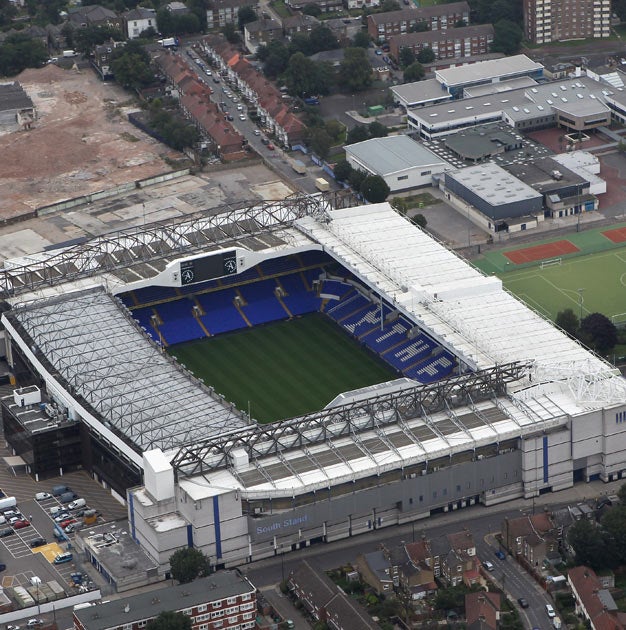Tottenham reveal plans to raise funds for new stadium

Your support helps us to tell the story
From reproductive rights to climate change to Big Tech, The Independent is on the ground when the story is developing. Whether it's investigating the financials of Elon Musk's pro-Trump PAC or producing our latest documentary, 'The A Word', which shines a light on the American women fighting for reproductive rights, we know how important it is to parse out the facts from the messaging.
At such a critical moment in US history, we need reporters on the ground. Your donation allows us to keep sending journalists to speak to both sides of the story.
The Independent is trusted by Americans across the entire political spectrum. And unlike many other quality news outlets, we choose not to lock Americans out of our reporting and analysis with paywalls. We believe quality journalism should be available to everyone, paid for by those who can afford it.
Your support makes all the difference.Tottenham chairman Daniel Levy insists the club remain committed to delivering Champions League football as they announced plans to de-list from the stock market and return to private ownership in a bid to raise funds for a new stadium.
Spurs revealed they would propose the move to shareholders on the same day as they published their annual financial results, which saw them make a profit of £402,000 for the year up to June 30.
That represented a huge improvement on the previous year's loss of £6.5million, helped by the club's first Champions League campaign.
That campaign generated income of £37.1million from gate receipts and prize money, but Spurs had to settle for a place in the less lucrative Europa League this season.
Given the continual drain of improved player contracts, Levy knows how important extra revenue will be to move forward.
"Last season we played some of the most entertaining football of any team in any league in the world," he said.
"We shall fully embrace the Europa League this season and push to achieve all that we can, whilst also ensuring that we focus on our goal of rejoining the UEFA Champions League."
Levy accepts the wage bill must be kept in check, which can often prove a difficult balancing act.
In his report to shareholders on Spurs' financial results for the year ending June 30, 2011, Levy said: "We retained a large squad to give ourselves the best chance of success and ensure there was sufficient depth in the squad.
"More players, along with salary inflation, performance-related bonuses and increases in football expenses, resulted in football operating expenses increasing during the year.
"Post year end we have reduced the squad size, enhanced the quality and continue to focus on retaining core players on long-term contracts.
"This invariably means new longer-term deals on higher, competitive salaries.
"We continue to work, however, on driving revenues to ensure that the wage to revenue percentages remain within our key performance targets."
With UEFA's Financial Fair Play regulations - which aim to prevent clubs from spending more than they can generate - to be implemented soon, Levy knows there are challenging times ahead.
"We, your board, have always highlighted the need for a viable and sustainable business, operating within our means," he added.
"We welcome the forthcoming new system of Financial Fair Play in the game that we hope will level the playing field and endorse the way we have operated to date."
Tottenham's annual figures included record revenue of £163.5million, up £43.7million on 2010, while operating profit before football trading and amortisation rocketed by 42% to £32.3million.
Despite the relative healthy outlook, Levy insists de-listing the club from the Alternative Investment Market (AIM) was necessary to help raise funds for a much-needed redevelopment, which could eventually see the club sell lucrative naming rights.
Tottenham had bid to move into the Olympic Stadium, but that attempt failed.
However, following legal challenges by the north London club, plans to award the stadium to West Ham were scrapped and it will now go back out to tender.
The Hammers and Leyton Orient have both said that they will apply for the tenancy.
Spurs, who have ruled out another bid, are in discussions with local and national government about building a new 60,000-seater stadium on the ground adjacent to White Hart Lane.
The plan, known as the Northumberland Development Project, was launched in 2008, but looked set to be scuppered by increased costs until recently.
"It is clear to us that increasing the capacity of the club's stadium is a key factor in the continued development and success of the club and will involve the company in considerable additional capital expenditure," Levy said.
"Given this requirement, we believe that the AIM listing restricts our ability to secure funding for its future development.
"We are ambitious for the club and have always taken the steps that we believe to be in its best interests."
On the pitch, Tottenham are well placed for another crack at the top four after an unbeaten league run of eight games lifted them to fifth in the table with a game in hand on the teams above them.
Manager Harry Redknapp could be back in the dugout for Monday night's clash with Aston Villa at White Hart Lane following a minor heart procedure.
PA
Join our commenting forum
Join thought-provoking conversations, follow other Independent readers and see their replies
Comments